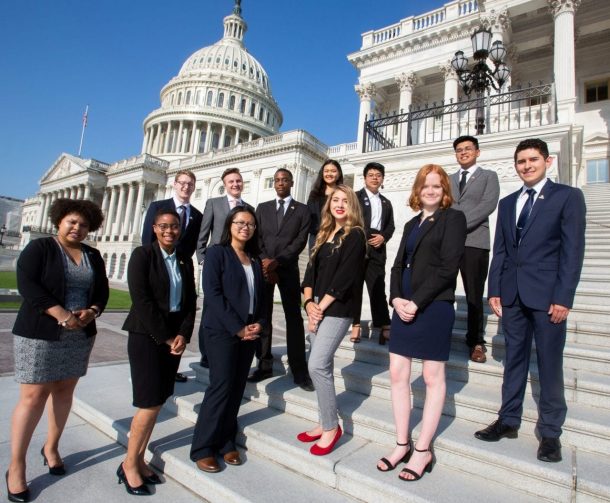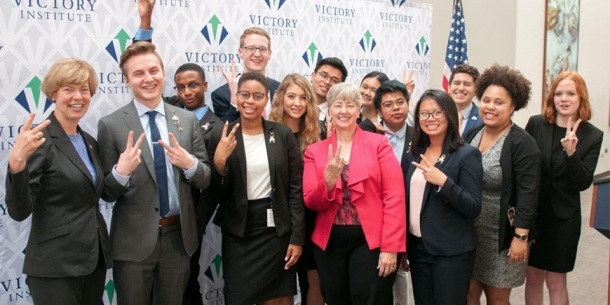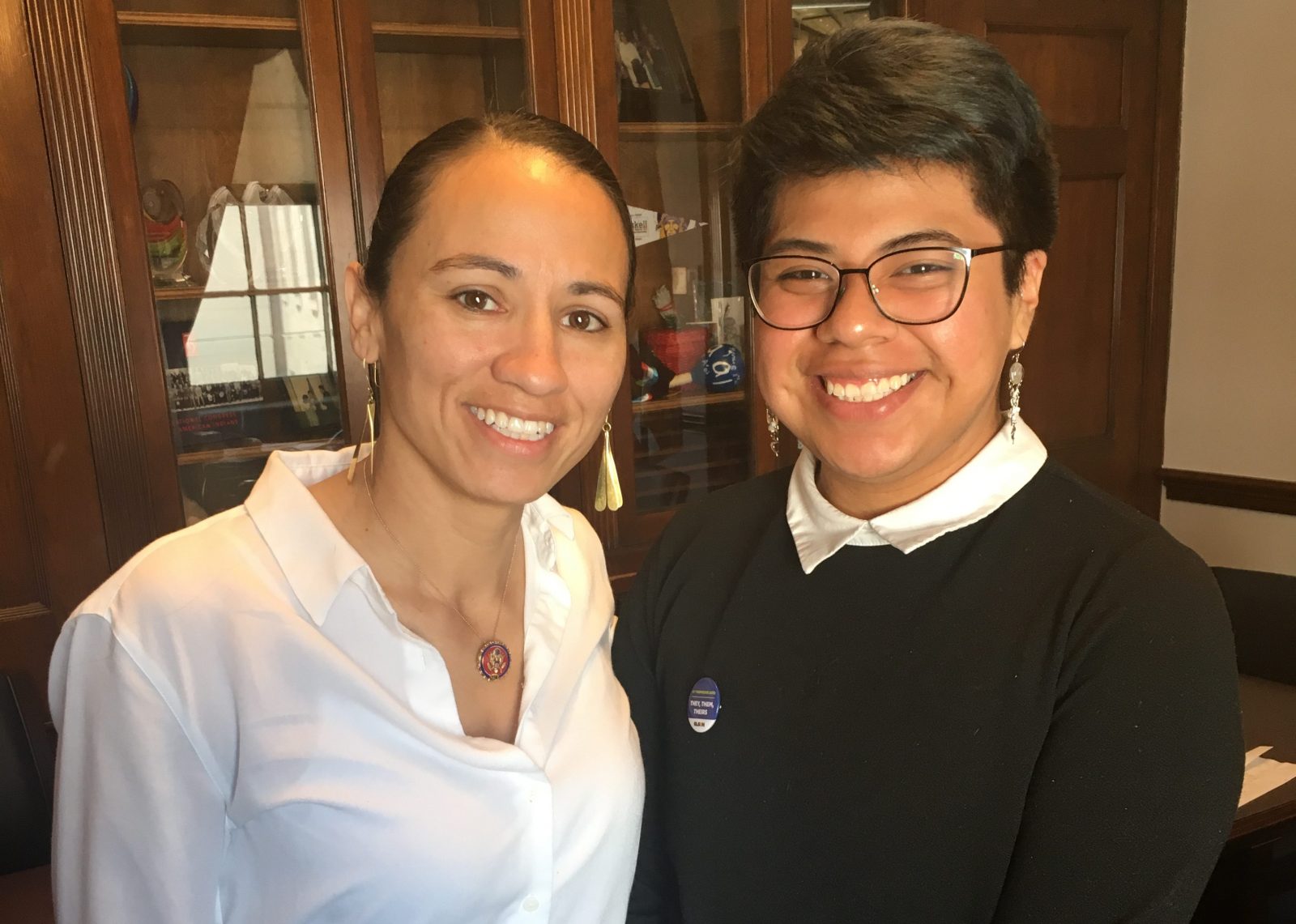by Elí Alejo, 17F
Common Good Summer Intern Elí Alejo was one of twelve outstanding students nationwide who were selected for the Victory Institute’s Congressional Internship. This intensive summer leadership development program works to increase the number of LGBTQ people in public office, and provide the training and professional network to support their success. Elí worked as a Legislative Aide with U.S. Representative Sharice Davids of Kansas’ 3rd Congressional District, assisting with the legislative process and learning about careers in policy-making. Elí’s summer work in Congress was supported by the Common Good Summer Internship Grant and James Baldwin Scholars’ Divison II Internship Grant. Elí shares their experiences with falling in love with Washington, D.C., leaving their mark on the Hill, and challenging the gender binary in the office in their reflections from the Victory Institute’s blog.
#803 and Blistered: A Beginning
“It takes a village to raise a child” – African Proverb
Week one of the internship is done! We deserve to pat ourselves on the back. I am taking up space in the political system that has worked to exclude me due to my radicalized and/or marginalized identity. Be proud because you made it for those who could not make it, for those who came before you and for those who will come after you. You have successfully made a home out of nothing but a community of your peers and yourself.
Before coming to DC, I never had a chosen family larger than three people. I have never felt more welcomed and held than I have with my intern cohort, who I already call family. If you, like me, have never experienced the feeling of “home” you now know that you will find it with your cohort. There’s comfort, understanding, and, most importantly, love. This family will understand the intersections of your identity, and if they don’t already, trust me, they will be more than willing to learn. Our dorms, #803, #804, and #805 are never seen as separate homes, but rather, different areas of our home, much like your living room, kitchen, etc. It never feels like we are in separate spaces – we’re always together.
Victory Institute becomes your second home. Sarah, Mario, and the rest of Victory Institute become family. You see family at Victory, with their big smiles and excitement to meet you. As a trans non-binary Latinx queer, these opportunities are very limited, and once you walk through the doors of Victory Institute, and then later, onto the Hill, all you can do is repeat to yourself, “I did it, I made it. I made and did it for my mother, my siblings, my transcestors, and most importantly, myself.”
Mutual aid and solidarity are found in every corner, there’s light that reaches even the darkest points. This is not to say we haven’t had moments that have become difficult as we have begun to talk about race, class, gender abundance, and politics. But remember this: you will listen; be prepared to learn and grow.
Those first day anxieties or worries? Everyone shares them and chances are, you might stay up until midnight the night before orientation with your family to talk about them. Talk, talk, talk until you cannot say anymore, let it out and you will be held. In our circles, we always remind each other, “You are in a safe space,” meaning all of you is welcomed. Trust when I say all of you: your traumas, your tears, your smiles, your growth, the list can go on. I feel my growth and I am excited for who I will become after this summer, but I can already feel the sadness of knowing I will have to leave DC, not because of the city, but because of the family I have made already.
The 5 mile walk on the second day of orientation left me blistered, but hopeful for the future. We are the faces of tomorrow. My blisters have now become a memory of the talks we had through the tunnels underneath Capitol Hill, discussing our future of making equitable change for the folx we will one day serve. It reminds me of how proud I am of everyone in my family. We made it – we defied all the obstacles to get to where we are. We’re here, we’re Queer, and we’re not leaving. Thank you, week one, for showing me love and resilience. I’m ready for the rest of summer, no matter how difficult it may be, because I have my family with me.

Resilience: A Middle
I fell in love with a new city – one I thought I would never get used to. Despite the humid weather, the Metro rush hour, and long lines at the grocery store, DC has life to offer. I won’t lie and say I haven’t been homesick for my comforting home in Amherst and my busy bee life in Los Angeles, but I have finally adapted to my DC routine and have become in sync with the world in D.C, something that usually takes time for me when making home in another city. It is somewhat disheartening to know I will be packing up again soon, but I can assure myself that I have left my mark here.
Working on the Hill has taught me resilience. However, it has only taught me resilience because it was starting to wear part of me down. I became more aware of how my gender and its presentation challenges the gender binary that is existent on Capitol Hill. I have been misgendered and subjected to a gender guessing game, based on how I choose to present myself on a given day. Through this discomfort, I have learned that the questioning of who and what I am is enough to make people begin to question the binary that is enforced within these institutions. I have become comfortable with accepting that I, as a non-binary trans individual, am doing enough by simply existing and being in these spaces. At the beginning of the internship, I was anxious about having to justify my existence on the Hill, but soon learned that simply living and being my authentic self is enough. I thank the other intern in my office, who also challenges the gender binary daily, for helping me ground myself when times become tough.
I am partly relieved that despite the transphobia in macro or micro instances, my office believes in me and the work that I am doing. From doing day-to-day intern work, I have advanced and been trusted to do more staff assistant and legislative work. The legislative director and legislative assistant have offered me opportunities I wouldn’t have experienced if it wasn’t for how much they believed in me and my work. I am now writing recommendations, researching bills, attending briefings, or simply providing the Congresswoman with what she needs. After a month of working in the office, I have gained the skills I sought out when applying for this internship. I am becoming familiar with how the government is run and how to bring back the knowledge to my community to build more resistance and passion for change. As much work as it is surviving on the Hill, it pays off when I remember that I made it this far for myself and my people.

V12: An Ending
During the graduation reception, I realized how far I had come from the beginning of summer until now. It hardly felt it had been eight weeks. I was beginning to get used to the routine and the people I was constantly around. The Victory Congressional Interns were my first “chosen” family; it became hard to imagine leaving them. I felt similarly on my last day in the Congresswoman’s office. I had to confront the fact that I was leaving the other interns in my office, the staff assistant, and the legislative director. I find it difficult to begin to write about the ways I grew professionally, mentally, and emotionally. With my chosen family, they challenged me to become a better communicator and guided me towards ways to take more initiative. Leaving DC I’m more confident with myself and my abilities to create change in my community.
The Hill isn’t easy for those with a racialized and/or marginalized identity. I’ve experienced a variety of spaces that feel more welcoming than others. In some spaces, I have found myself often being the only person with my racial and marginalized identity. My brownness and trans-ness are inseparable and set the tone for the experiences I will have in the workplace or public spaces. Through hardship, I have learned the importance of a strong support system and self-care. Days will get tough and tiring but having a system in place lessens the emotional impact.
If someone were to ask me what is one thing you would tell someone who is coming into the Victory Congressional Intern program is to be open to what community can look like and feel like. It’s challenging as a queer individual to find community and make spaces that are judgement free that fully accept all of you. As a support mechanism, I recommend reading books that are about queer resistance. I had the pleasure of reading Stone Butch Blues by Leslie Feinberg, the novel became part of my growth. It’s comforting to know about the universe(s) of queer existence in time and space. James Baldwin’s The Fire Next Time was another novel I had that helped ease my anxiety about existing as a person of color in predominantly white spaces.
In regards to my professional development, I felt like I thrived this summer; my challenges ultimately refined my skills as a writer and researcher. Within my first week of working in the office, I was given responsibilities that many interns hardly receive. I was tasked to keep track of bills the Congresswoman had co-sponsored, I attended briefings on behalf of legislative staff, and then wrote memos about the topic. The memos ranged from aviation regulations to banning conversion therapy. I had to learn about Kansas and the constituents the Congresswoman served when writing recommendations on bill voting.
Working for Kansas District 3 taught me how to work with constituents who were on the moderate spectrum when it comes to progressive legislation. I had to learn what were the priorities for Kansans and who they were: from their unionizing rights to their educational curriculum. Growing up and studying in progressive states like California and Massachusetts only exposed me to a limited view of the political world. I’m thankful to have been politically challenged because the skills I have obtained will better equip me for any governmental position I will have in my educational or professional career.
Lastly, I am grateful for what I’ve learned this summer, not only about myself but my peers. I take away lessons on building community, fostering acceptance, and reimagining a world where our struggles as LGBTQ+ and/or BIPOC (Black, Indigenous, and People of Color) are no longer existent. I leave this internship hopeful about the future of my cohort and am equally excited about the leaders that they will all become. I thank Victory Institute for creating a program where I can envision myself and my future political path. Without the contribution of Victory Institute and my cohort, I wouldn’t have grown within the last two months. This experience is one I will not forget and it is one I will carry to encourage others that change is possible.
Elí Alejo 17F is a queer Latinx artist and mentor who is studying Latin American Studies, Studio Art, and Public Policy at Hampshire College. Outside of academia, Elí focuses on community building, admiring dogs on/off campus, and creating art.





